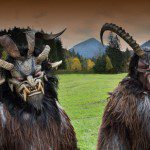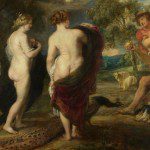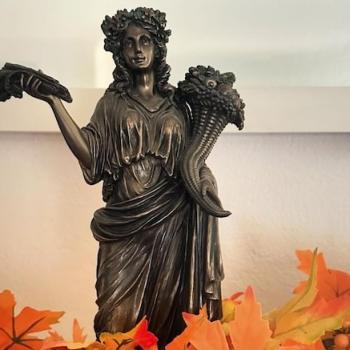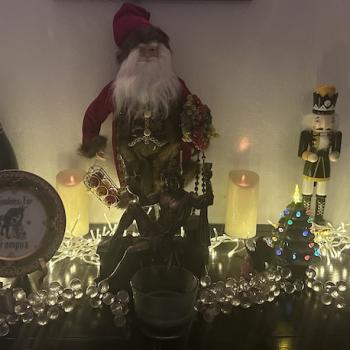I really tend to like Yule and the whole extended “Holiday Season.” It’s full of all sorts of traditions and customs, and the best part is that many of them are truly Pagan. Probably not as many as we like to think, but still a very significant number. When I hear people complain about how “their holiday” is being taken from them I can’t help but laugh. It was the Pagans who had their holiday taken from them, or at the very least many ancient pagans allowed it to be evolve into something else.
Super Holiday content at Raise the Horns:
The History and Origins of Santa Claus
The Other Gift Givers: Beyond Santa Claus
Christmas Traditions: Christian or Pagan?
Christmas Is Not Yours or Mine (On the True Origins of the Holiday)
Because this ritual is meant to be fun, not everything in it is literally true! I’ve taken some very big liberties with some of the history. But it’s a ritual, not a term paper, and at least I didn’t claim that Santa Claus was inspired by magic mushrooms or anything equally outlandish. Happy Yule!
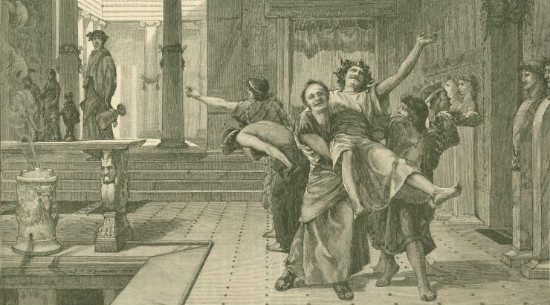
(From WikiMedia)
Cast & Crew
Narrator
Dionysus/High Priest
Diana/High Priestess
Yule Revelers/Quarter Callers
Saturnalia Revelers/Quarter Callers
Odin
Circle Caster
Narrator: As we approach the Winter Solstice we are constantly reminded by a very loud vocal minority that their holiday is being stolen from them. The greetings aren’t correct, the cups are the wrong color, there aren’t enough manger babies, etc. Like you, I can’t quite sympathize with these people because if anyone had their winter holiday stolen from them it was us! The Pagans!
Many of our folk look towards Samhain and Halloween as the season of the Witch, the most Pagan of all the holidays, but for me it’s always been our Midwinter celebrations. So much of it is simply ours, our ancestors were the ones who did it first, and better than anyone else. So tonight as we celebrate Yuletide we look backwards, into the distant pagan past and take back the traditions that are ours. Tonight we take back Pagan things!
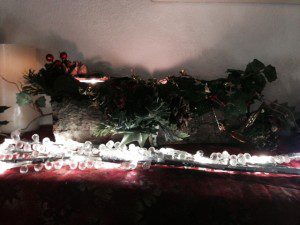
High Priestess: This light is for the Crone, for short days and long nights. May her presence and spirit fill this place. So mote it be!
High Priest: This light is for the young God, reborn upon the Solstice to keep watch over us in the sky. May his presence and spirit fill this place. So mote it be.
Narrator: And this light is for Midwinters past, present, and future. May we learn, may we love, may we revel! Hail the Yuletide!
(Our Yule Log has spaces in it for three candles, if you don’t have such a thing you could easily just substitute some candles.)
Circle Casting
Between the worlds we will stand, in a time that is not a time and a place that is not a place. In the confines of our magic circle we shall see worlds past and worlds yet to come. Let the light and spirit of the season shine in this our sacred space! The circle is cast, so mote it be!
Calling the Quarters
East: We call to the spirits of the East, spirits of inspiration and knowledge. As the sun rises in the East we thank you for the rebirth of the light that brings us so much joy at Yuletide! In every light and every candle, we see the reflection of the newborn Sun-god! May your light and wisdom shine bright in the dark days ahead. Hail and welcome!
South: We call to the spirits of the South, spirits of passion and desire. As it’s desire that allows us to see beauty, we thank you for the poinsettia that decorates so much of our world this time of year. From Mexico to the world the poinsettia has taken its place as a symbol of Midwinter’s rebirth. May your beauty and intensity warm us in the cold days ahead. Hail and welcome!
West: We call to the spirits of the West, spirits of love and emotion. As its love that binds us all together we thank you for the mistletoe that brings so many of us closer. From the sacred rituals of the Druids to our rites today, and who doesn’t like to kiss? May your devotion and yearning bring us closer to the ones we love, and especially the ones we love to kiss. Hail and Welcome!
North: We call to the spirits of the North, spirits of foundation and place. As you watch over us from the high mountains we thank you and implore the spirits Of snow to join you in that place. Let every decorative snowflake be a harbinger of the snows to come that will fill our reservoirs and fill our hearts. May your watchful gaze keep us safe and with loved ones this Holiday Season. Hail and welcome!
(When my group did this ritual I had each of my quarter callers stand with the objects mentioned while summoning the elements. For the East we used a candle, and for the North a snowglobe. Obviously the call to the North was written in reaction to California’s ongoing drought. It doesn’t snow in Sunnyvale, but it’s the snows that fill our reservoirs!)
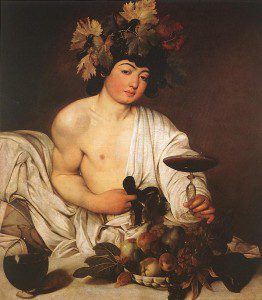
Tonight we call to great Dionysus, god of passions, wine, transformation, merriment,and mirth! Through the ages you have taken other forms to stay close to the folk, even when they turned their back on you. In the Middle Ages you were the Lord of Misrule, upending the social order, promoting a fluid sexuality, and bringing happiness to hearts in the depths of Winter. You are the one who raises the torch as the Spirit of Christmas Present, bringing warmth and fellowship to all who gather to celebrate the holiday. At your side are ignorance and want, reminding us that there is much work yet to be done in this world, and that a holiday well celebrated means caring for the others around us.
Join us in our ritual and revels oh wine god! Be with us as your people celebrate your season! Hail and welcome!
Calling the Goddess
Tonight we call to the powerful Diana, goddess of Witches, witchery, hunting, the moon, and the wild places. You have ever stood beside us, changing your form and face so that you might ever be a part of our worship and celebration. Today some know you as Aradia, goddess of Witchcraft and rebellion, the inspiration that began the Pagan revival. In many parts of Italy you are known as Belfana, the Christmas Witch, bringing gifts to all the good girls and boys, presents delivered without smelly reindeer but from a broom, as all good Witch gifts are shared! Join us in our rituals and revels great Huntress! Be with us as we celebrate your season! Hail and welcome!
Scene 1
Narrator: Let me take you back thousands of years, long before babies in mangers or any of that other nonsense. Tonight we head back to a cold night in Midwinter near the solstice where two individuals are celebrating the holiday of Saturnalia. Celebrated for seven days the Saturnalia was the merriest time of year in old Rome. There was drinking and celebrating, and of course the exchange of gifts.
Fausta: Good evening Quintus, I hope you are enjoying the Saturnalia festivities.
Quintus: What is there not to enjoy my dear Fausta? Nearly everything is closed and there is much wine to consume. There are also gifts to be received, who doesn’t like a good present?
Fausta: I always enjoy a gift of course, unless it’s that fish paste from Pompeii, I just don’t like that.
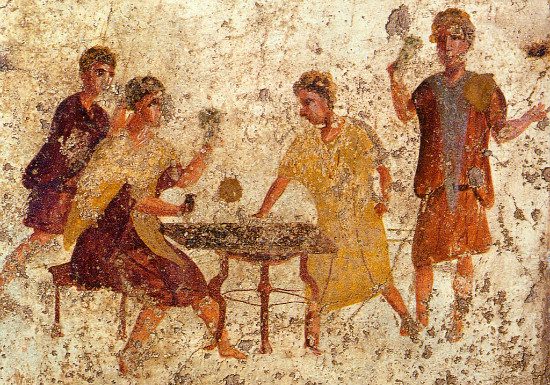
Quintus: My children are always giving me togas at Saturnalia, how many togas does one man need?
Fausta: Indeed, before I depart to my home I have a gift for you quintus, I hope you’ll enjoy it. Quintus: Thank you my dear. Shall I open it now? Fausta: Yes, by all means.
Quintus: Let me read the verse here:
You are always far more clever
When your tongue and mind are wetter
To speed up your inebriation
Here is some cider suitable to your station.
Thank you so much my dear, what a lovely gift. I have one for you as well.
Fausta: Let me just read the card …
You are as lovely as the flower
And I hope to do all in my power
To make you my mistress and my lover
Please hide my heart under your covers.
Dear dear Quintus, such clumsy rhyme might work with your concubines. But it won’t work with me. Thank you for the perfume though, I’ll wear it when my boyfriend visits later tonight.
Narrator: And scene! Gift giving is ours and always has been. We did it first, and sometimes better. Tonight we have a small gift for all of you (pass out small gifts), that’s right it’s an ornament! Many of us place similar objects on a Yule tree and then look at how pretty and shiny they are. Tonight though we are going to have you draw on your ornament. We are passing out the markers as we speak, and I just want you to think about what you want to bring into your life over the next year.
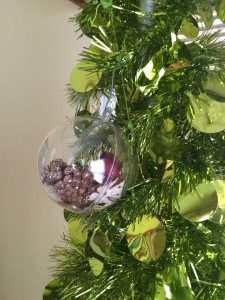
Now hold your ornament in your hands (dim the lights) and think for a second about what you would like to attract in your life. Visualize it in your mind and put that energy into your ornament. Imagine yourself walking by it in days to come, and as you walk by it visualize those things that you want in your life. What we can see we can make a reality. So mote it be!
(I wrote this ritual originally intending to have people draw on simple plastic ornaments, and then found some clear empty ornaments that are easily filled with things and did that instead. For the ritual I spread out a number of things that might symbolize things people want to attract into their lives: pinecones (God), seashells (Goddess), tiny decorative lightbulbs (inspiration), rose petals (love), angels (spirit guides), Santa hats (joy and giving), coins (money), and a few other various odds and ends. I thought this idea was genius, but instead of quickly filling up their ornaments people went through the process very slowly, and one guy took 70% of the very popular rose petals. It was kind of a mess and I didn’t have the right music queued up to fill the silence.)
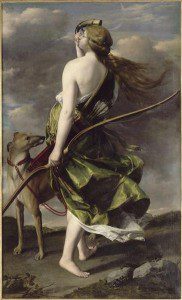
Narrator: And now let us visit a hillside near Mount Olympus, there two gods are out and about preparing for the Midwinter feast led by Zeus. Dionysus and his sister Diana are making last minute preparations for the festivities that are soon to begin.
Dionysus: So dear sister, what are you bringing to tonight’s feast?
Diana: Without me there is no feast, for tonight’s feast I have shot two wild boars, my nymphs are dressing them now! We couldn’t leave such things to you dear brother, though I suppose you might have gotten lucky “aiming for the middle one.”
Dionysus: True, wine is not the best hunting companion. I’m fine with that though, I have a special treat for everyone tonight, and I always bring the best gifts.
Diana: More of that special wine? What did you call it, whiskey? I swear that after just a few drinks I couldn’t even see the moon.
Dionysus: Of course I’ll be bringing that my dear, but I’ve got another thing tonight. I cut down an evergreen tree and I’ll be setting up in Father’s house.
Diana: Why would you ever do that?
Dionysus: It can serve-as a gathering spot, we can put our gifts to one another upon it. Besides who wants to hold onto their ornament the rest of the night?
Narrator: And scene. According to some traditions it was truly Dionysus who brought the first evergreen tree to a Midwinter holiday. Dionysus is not just about the wine, sometimes he’s simply about bring folks together.
Now I bid all of you to gather around and place your ornaments upon this tree of Dionysus. As a tree of Dionysus its branches will bless and amplify our magick.
(Everyone brings their ornament up and places it on the tree. If you have singers, this is a good time for a Christmas carol.)
(Did Dionysus and/or his followers invent the Christmas Tree? Most likely not, but the Greeks and Romans did decorate with evergreen trees and their is a picture of Dionysus carrying an entire evergreen tree to a Winter celebration, so it’s not completely untrue. People put their ornaments on the tree much faster than they made their ornaments when my group did this last weekend.)
Scene 3
Narrator: And now we leave the Roman Empire and head north, to the year 853 of the Common Era. There on a cold night near Midwinter a family awaits the return of their annual gift-giver, Odin.
Aslog: Did you hear what Kurt and Ragna are doing this Yuletide? They had their children put out shoes for some sort of Nicholas?
Geir: Bah! They are just stealing our traditions. Everyone knows that it’s Odin who fills the children’s shoes! Upon his horse Sleipnir it’s Odin who lands on every rooftop and leaves wisdom and gifts. Or at least parents such as I do it in his name! I certainly wouldn’t want the wrath of Odin upon us if we chose not to participate in his traditions.
Aslog: Nor would I my dear, though Odin has been good to us and our people over the centuries. He’s certainly a lot less bloody than the man-god the neighbors are celebrating.
Geir: Very much so, and he has also given us mead! I love the mead, the gifts of Odin ever do flow!
Narrator: And Scene! Yes, it was Odin and Thor who were the first gift givers at Yuletide. They are our traditions, and what’s that I hear? Are those bells and ruins rattling? Could it be Odin coming to join us tonight?
(Ideally Odin would make a grand entrance like Santa Claus or something. Of course at my version of this ritual Odin just hung out near the altar the whole time. We were in a big enough space that he wouldn’t be able to hear his cues if he were outside and such a packed circle that we couldn’t hide anywhere. Oh well, the point of the ritual was mostly just goofy fun.)
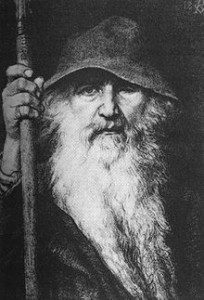
Odin: Hello good Pagans! Dionysus, Diana. I have gifts for this this night of Yule. I have brought with me merry cakes and merry meads! I do know the greeting many of you use, “merry mead, merry part, and merry mead again!”
Narrator: That’s not quite right, but we thank you for your gifts. Will you help us bless it?
Odin: Of course my child, Dionysus, Diana, will you help us as well?
Dionysus: May our days and nights be merry and bright! In the name of the gods and goddess of Yule we bless this drink. May you never thirst!
Diana: Let nothing you dismay, remember that the light was reborn on Midwinter’s day! The light that blesses and grows the grain! In the names of the goddesses and gods of Yule we bless this food! May you never hunger!
(Food and drink are passed around, etc etc. If your group is small, ours was 40 people, your Odin could pass out all sorts of presents to coven/circle/grove members. And Odin and Santa Claus are at least cousins.)
Goodbyes
Narrator: And now we must say goodbye to those assembled here this evening ….
Odin: I have given you gifts, I have warmed your spirits, and now I must return to my snowy realms. Before I go though, remember always that when you see the man in the little red suit you are seeing a reflection of me. I am with you always! Hail and farewell!
(Odin leaves)
Diana: In this time of plenty it is Diana we thank for our bounty. When our tables are laden with sweets and meats it’s Diana we shall thank! And as Belfana bring your Witches all the gifts they deserve this Holiday season. Hail and farewell!
Dionysus: Dionysus, spirit of this time and place we thank you for lending your energies to this rite. As we sail the winds of the Holiday Season we shall see your gifts when we look up an evergreen or know the joy of wine! Hail and farewell!
Quarters Out
North: Spirits of the North, spirits of Earth thank you for joining us in these our rites. In the days to come may snow gather on your mountains renewing life and the land. Hail and farewell!
West: Spirits of the West, spirits of Water thank you for joining us in these our rites. In the days to come let us feel your loving energies under the mistletoe and wherever we may gather! Hail and farewell!
South: Spirits of the South, spirits of Fire, thank you for joining us in these our rites. In the days to come we shall look upon the red leaves of the poinsettia and see your energies smiling back at us. Keep us warm keep us safe! Hail and farewell!
East: Spirits of the East, spirit of Air, thank you for joining us in these our rites. In the days to come we shall look upon the sparkling lights everywhere in our world knowing that they represent the sun that rises in your cradle and grows stronger everyday. Hail and farewell!
Closing the Circle
I cast this circle as a place of joy, merriment, and mirth. It has served us well, and now we leave this place that is not a place and this time that was not a time. We return to our own realms, secure in the knowledge that these holidays and their traditions are ours! So mote it be!
Extinguishing the Yule Log
High Priestess: Crone guide us through the dark time! (Blows out candle.)
High Priest: Sun god be reborn! (Blows out candle.)
Narrator: Midwinter has been celebrated past present and future. Merry meet, merry part, and merry meet again! (Blows out candle.)
FINS


